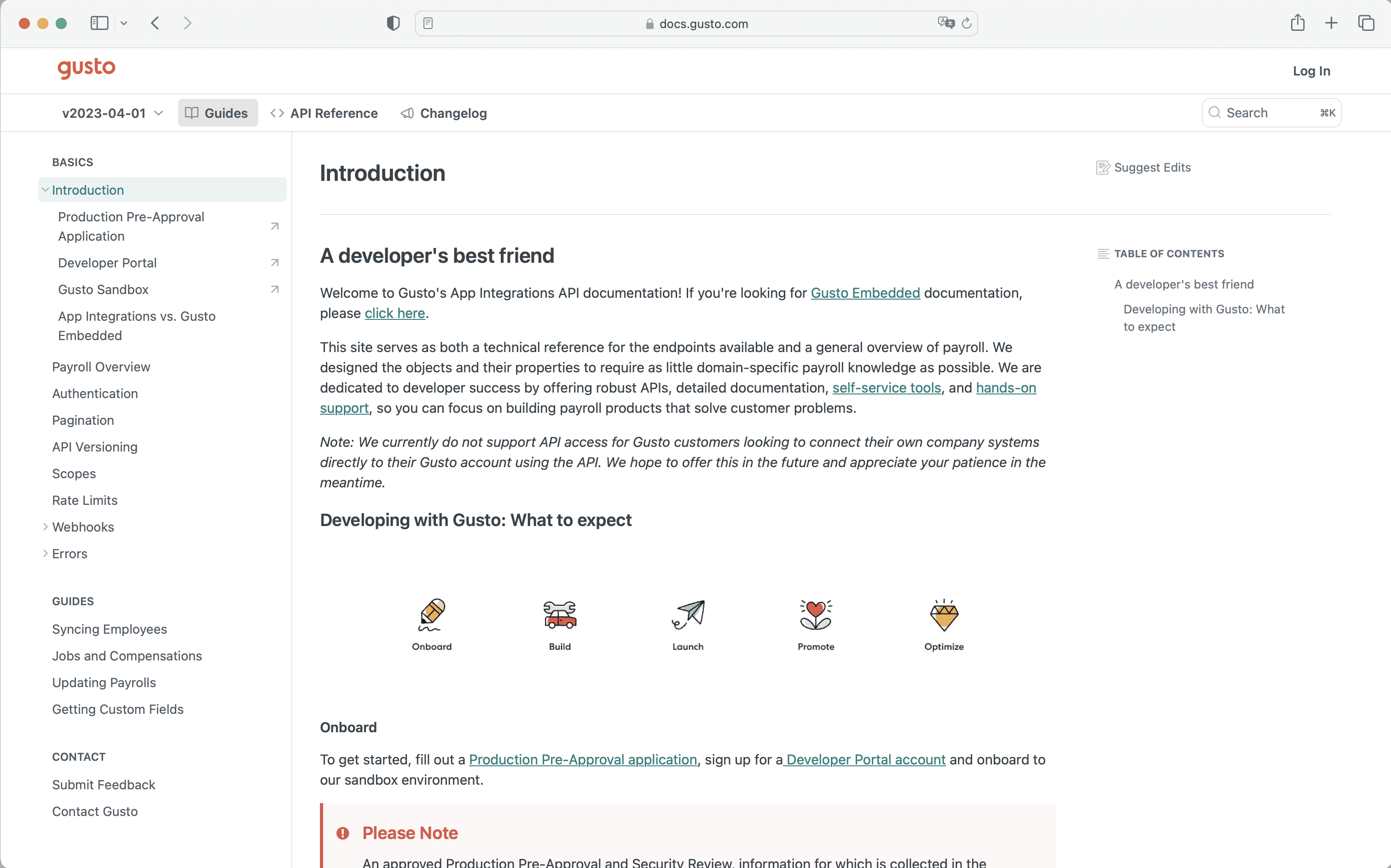Founded in 2011 to reimagine payroll for businesses and employees, Gusto has built out a thriving product and user base. More recently, they’ve invested in growing the developer ecosystem via Gusto Embedded and looked to build out top-quality documentation for their developer audience.
Payroll can be complex and confusing with extensive regulations and compliance laws, but Gusto’s APIs allow developers to leverage their platform rather than take on the technical and regulatory implications themselves. The Gusto Embedded API allows other products to embed payroll functionality directly into their apps with Gusto powering the experience behind-the-scenes, and the Gusto App Integration API unlocks partner integrations that streamline Gusto customer workflows.
The Gusto platform team needed a solution that could power comprehensive docs and resources across both APIs in one seamless hub. Their previous documentation solution was struggling to keep up with their needs, and they turned to ReadMe for the next chapter for their developer platform.
A Focus on Performance & Reliability 🔍
Before building with ReadMe, the Gusto team experienced issues with downtime and inconsistencies in merging updates to the documentation. They were also starting to feel held back by the lack of analytics, which made it difficult to measure success and adjust course accordingly.
Switching was an internal decision driven by a desire to improve their developer experience, with an engineer on the team suggesting ReadMe after having used it at a previous company. The team was drawn to developer tooling improvements like the Try It playground for their APIs and providing code samples in multiple languages — as well as upgrades to the hub experience overall, including more useful search results, a built-in changelog, and community engagement features, like suggested edits.
Another important factor was the ability to integrate with Okta to manage teammate licenses, as increased security was a top priority. And, given their downtime struggles, long-term scalability and reliability was top of mind. After talking with the ReadMe team and evaluating more reference customer hubs, the team felt confident ReadMe would be able to deliver the performance and professional look and feel they were seeking.
Taking the Pain Out of Payroll ❤️🩹
A common challenge for API documentation is making it accessible for both business and engineering users. In addition to this, Gusto’s developer hub needs to explain compliance and regulatory requirements in a way that can be easily understood regardless of the user’s background. “In one case, there are 100 requirements for your technical implementation in order for you to successfully and compliantly run your payroll,” said Avery LeBarge, Head of Solutions Architecture for the Embedded Payroll team. Most developers looking at Gusto’s documentation haven’t ever worked on payroll before, so it’s especially important that they understand all of this background information.
One of the ways ReadMe stood out over alternative solutions was native, robust support for creating additional guides and tutorials beyond the API reference itself. Gusto’s guides crucially explain not only the technical side of the process, but also provide context and background on why data is structured a certain way or API calls have to function a specific way for compliance purposes.
Payroll is so complicated, and we have to explain a lot of concepts to partner devs. For example, not many developers have spent lots of time with financial risks. We work hard to make these risks easier to understand, to ensure that based on their build partners understand the risk they're taking. Avery LaBerge, Head of Solutions Architect
It’s helpful that there are multiple ways to explain information and support users within ReadMe. The guides are created for users who want to read everything they can and ask questions, with FAQ sections continually being added and updated. The Gusto team has commented on how easy it is now to publish and edit guides. The API reference is also kept up to date and allows users to try out the API in real time and start building their integration. And if there’s something that’s too in-depth to be explained with just an endpoint, they can easily link back to the relevant guide. Code samples are also in heavy rotation in both the guides and the API references — ReadMe’s robust code sample generation and support was a notable plus for the team.
We have code samples everywhere so users can ask, "How do I create a company compliantly?" And we can say, "Here are the steps. Here's the exact code that does it. Avery LaBerge, Head of Solutions Architect
Managing Multiple APIs 🤹
The way Gusto uses ReadMe (along with the initial decision to use it) is heavily influenced by having more than one API in their platform. Between the two APIs — one for Gusto Embedded and one for App Integrations — there are 60 shared endpoints. “With any other tool, we couldn’t easily differentiate between the two concepts,” said Avery, noting that it often created confusion for developers trying to use only one or the other. In Gusto’s case, each API has a different user persona with very different goals, so it was critical to clearly differentiate the documentation. ReadMe’s ability to manage multiple distinct APIs in one developer hub was unique in the market.
It’s also a benefit that the APIs are differentiated on the backend in separate projects as well. For one, it makes it much easier to track errors, usage, and other metrics for each one individually, instead of only being able to look in aggregate. It also helps from a workflow perspective, as the APIs are managed by different teams: ReadMe enables them to operate and maintain their documentation independently, without either team being a bottleneck for the other.
Looking to the Future 👀
For the Gusto team, the difference is remarkable. Their new documentation is more reliable, streamlined, and usable — and they can rely on it to scale with them as they grow. We’re inspired by their focus on developer experience and documentation, and couldn’t be more thrilled to support them along the way!







